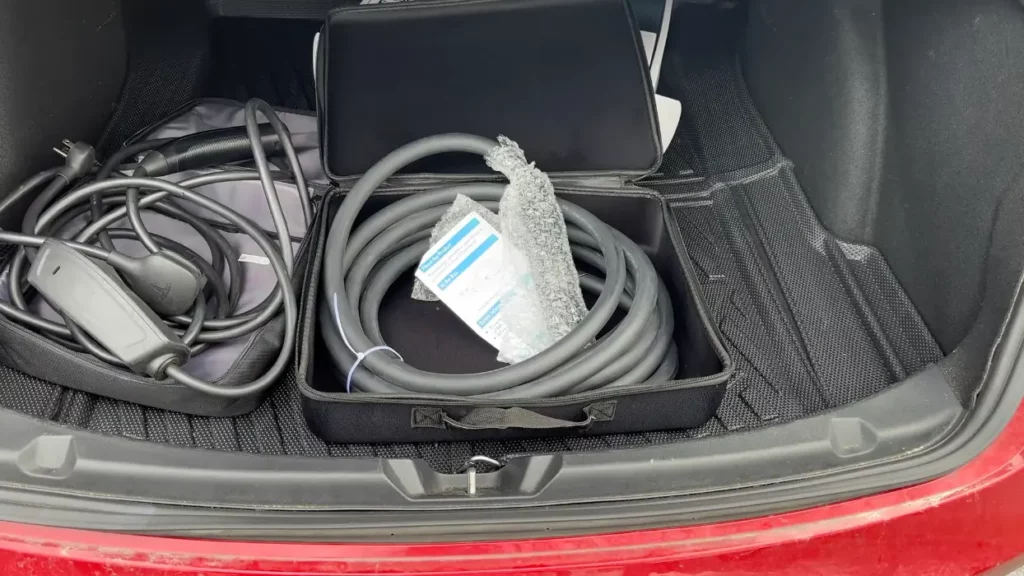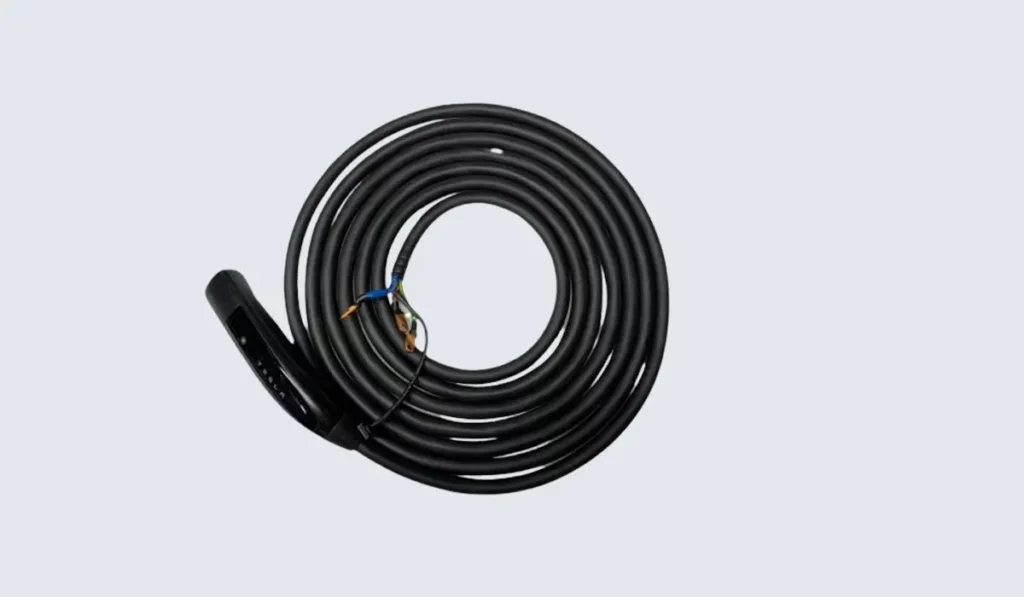Tesla provides high-quality thick (high resistance) charging cables, but even the most durable cables can wear out or need replacement over time.
Are you a new Tesla owner unaware of Tesla charging cable types? Or are you in need of a new charging cable for your Tesla but unsure what to do?
Quick Glance:
- Tesla charging cables no longer come with new cars as “standard”. You have to buy it separately either during purchase or later.
- For different Tesla Chargers (Mobile, Wall, and Supercharger), you will need different Charging cables recommended and provided by Tesla.
- If you notice any issues with your Tesla Charging Cable, contact Tesla, Tesla will provide the replacement if the specific type of Cable is available in stock.
- In most cases charging issues can be fixed by swapping the adapter instead of the entire cable.
Continue reading this article to find out everything you need to know about tesla charging cable replacement!

Understanding Tesla Charging Cable Types:
Before delving into the major details of Tesla charging cable replacement, you need to know what types of cables are originally used for charging Tesla electric vehicles:
Tesla UMC Charging Cables:
Tesla offers two types of charging cables with its Universal Mobile Connectors:
- The Generation (Gen) 1 or Type 1 Cable: This first-generation Tesla charging cords are 20 feet long and compatible with 13A 3-pin plugs, 32A Blue Commando Sockets, and 16A (11kW) Red Commando Converters. They can offer 2.3 up to 3.7 kW charging speeds for Model S, Model 3, and Model X produced between 2012-17.
- The Generation (Gen) 2 or Type 2 Cable: These cords are 20 to 24 feet long and compatible with various adapter options such as 110-volt NEMA 5-15, standard J1772, NEMA 14-50, BS1363, and 16A or 32A IEC 60309 Blue adapters. They can offer an 11.5 up to 16.5 kW range with a standard household outlet, while up to 32 amps charging speed with a 240-volt power outlet.
- How to Change Your Gen 2 Mobile Charger Plug
Note that if the damage on your Mobile charging cable is at its end portion or the adapter has turned faulty, you do not need to replace the whole cable.
Replace the charging cord as shown in the below tutorial:
2. Tesla Wall Connector Charging Cables:

Its hardwired Wall charging solution Gen 2 comes with a 24-feet length cable. This delivers up to 11.5 kW (at 240 Volt) or 48 AMPs and adds up to 44 MPH range.
The Gen 3 Wall Connector comes with 7.3-meter Type 2 (Mennekes) cables (compatible with most American and European charging stations) to add up to 71 km per hour of charging range. But the Tesla Gen 3 Wall Charger is also compatible with Gen 2 Connector’s (32 A) 2.6 m. or 7.4 m. cables.
3. Tesla Supercharger Cables
These Tesla Charging cables are equipped with two Cable (DC) connection options:
- Tesla Level 2 or Type 2 cables: are compatible with Tesla’s pre-facelift Model S and Model X.
- Tesla Combined Charging System (CCS) Cables: can boost up to 350 kW and are usable with all new Tesla Models, including its Model 3 and Y. They can also be used with non-Tesla electric cars to charge at Tesla Supercharging Stations.
- Tesla V4 Supercharger network: is only equipped with a CCS charging cable. However, if you have an older Model S or Model X, add a CCS adapter instead of changing your charging cord to charge your car at the V4 stations.
4. Third-party or Public Charging Station Cables:
If you ever need to charge your Tesla at a third-party or public charging station due to an emergency, no need to change the cable.
Just use the same Tesla cable you own but add a J1772 standard adapter before connecting your charging cable to the charger.
5. Signs That Indicate You Need to Replace Your Tesla Charging Cable:
1. Faulty Indicators:
Tesla electric vehicles are designed to show a “Blue” light when the charging cable is inserted. If this light goes out and the car locks without charging, this could suggest an issue with the cable itself.
2. Inconsistent Charging Status or Performance:
Normally a solid “Green” light on the charge port indicates that the charging process is complete. If your Tesla displays this status light while not being fully charged, it could be a hint that your charging cable is faulty.
Have you found that your Tesla takes longer than usual to charge? Does the charging process frequently stop or become interrupted? These are red flags that your charging cable may be faulty.
3. Visible Wear and Tear or Poor Repair Attempts:
Regularly inspect the physical state of your cable. Any visible cracks, kinks, exposed wires, or significant signs of wear and tear on the cables point to the need for a replacement.
If you’ve tried to repair the cable using tape or other temporary remedies, keep in mind that these fixes may not last long and may potentially cause more damage.
4. Frayed or Damaged Insulation:
The cable may fray or crack and expose the internal wires over time. But charging cables must be handled with caution, especially in public EVC parking lots.
Otherwise, it can pose major safety hazards, such as electric shock or short circuits during charging.
5. Overheating:
Excessive heat generation while charging your car is another potential sign. You may notice that the charging cable itself is becoming excessively hot to the touch or emitting a burning odor.
Related Post: Tesla Mobile Connector Charging Speed – How Fast Can You Get Going?
How Much Does It Cost to Replace a Tesla Charging Cable?
The cost to replace your Tesla charging cable will vary depending on the type of cable you need to replace. Tesla will provide OEM charging cables if your cable turns bad, but the exact cost of getting only cable hasn’t been disclosed by Tesla yet.
You can also get the refurbished or used Tesla Mobile Connector or Wall Charger cables from third-party dealers or independent online stores such as eBay, Walmart, or EVChargeking.
If you need to replace your entire Wall connector, the charger itself will cost:
- Standard Gen 2 Wall Charger $475,
- Universal Wall Connector $595
- Gen 3 Wall Connector $800.
Also, do not forget to consider an additional $750 to $1,500 cost of installing any of these Wall Chargers.
If you need to replace the Mobile Charger, the UMC Gen 2 itself will cost you $230 at the Tesla Shop and the Gen 1 (120 V) may cost around $220 at eBay. Luckily, there’s no installation expense when you’re replacing a Tesla Mobile Charger.
If the Charging Cable looks fine, but the end part of your charging cable or connected Adapter is bad, replacing the adapter will cost between $35 and $45. These adapters are also available on Amazon.
If you also find that your Tesla’s charge port needs to be replaced, this may cost you approximately $400 to $600.
However, you can purchase a single cable at a more affordable price from third-party stores or online platforms.
| Charging Cable | Compatible With | Price | Available on |
| 18 Feet (48 A) Charging Cable | Tesla Gen 3 Wall Charger | $150.00 | eBay |
| 8 Feet OEM 1457768-01-F replacement Cable | Tesla Gen 3 Wall Connector | $99.00 | eBay |
| 48A 24 Feet replacement Cable | Tesla Gen 3 Wall Charger | $180.00 | eBay |
A CCS adapter for charging your Tesla at Superchargers will cost between ($109 and $199) from a third-party or independent retailer and $175 ($475 for the Combo) from a Tesla Shop.
How to Disconnect the Charging Cable Safely from Your Tesla?
Follow this quick tutorial to safely remove your charging cable:
Related Post: Why Does Tesla Charging Slow Down? (with Solutions)
Frequently Asked Questions [FAQs]
Does Tesla offer Charging Cable Replacement?
Yes, Tesla provides charging cable replacements for their vehicles. If the charging cable of your Wall or Mobile charger is damaged or bad, you can replace it by contacting Tesla support.
Do all Tesla Models use the same charging cord?
Except for its original Roadster Models, all Tesla Models use the NACS connector. However, in Europe, its Model 3 and Model Y cars come with a CCS Type 2 charging power outlet.
Can you reset your Tesla Mobile charging cable?
Yes, unplug the connector or cable from your vehicle and press the “RESET” button. Then, reconnect the Mobile Connector back into your car.
